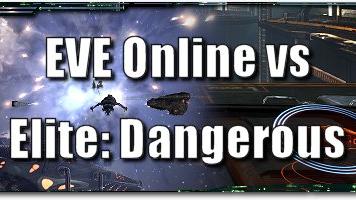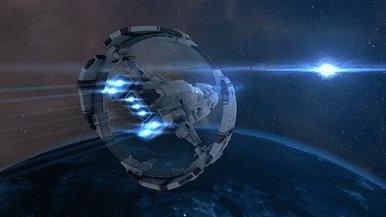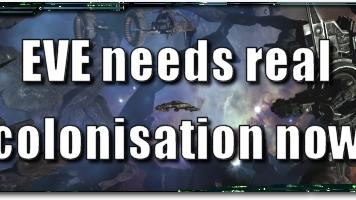braben
Latest

EVE Evolved: EVE Online vs. Elite: Dangerous
Like many EVE Online players, I grew up playing early sci-fi games like Elite and its sequel Frontier. In fact, CCP's recently released stats on the distribution of ages within the EVE community shows a peak around 29 years old, meaning that most players grew up in that same gaming era. A big part of what initially drew me to EVE Online was the prospect of playing the same kind of massive trading and space exploration game with other people, and for over 10 years it's scratched that sci-fi sandbox itch. I've watched EVE grow from a relatively unknown game with around 40,000 subscribers and laggy cruiser skirmishes into a vast game where thousands of players wage war for territory, profit, or just the adrenaline rush of PvP with something valuable on the line. Now that Elite: Dangerous is finally here, I want to see whether it can scratch the same sandbox itch as EVE and to what extent the two games can be compared. Both feature customisable ship fittings, open-world PvP with a criminal justice system, and real financial loss on death, for example, but the end result is two very different gameplay styles. And both also have that same intoxicating notion of exploring the unknown and try to make you feel like you're in a living world, but they take very different approaches to world design, content, and travel. Elite may not be a full-fledged MMO, but with a sandbox made of 400 billion procedurally generated stars and an open play mode that seamlessly merges players' games together, does it matter? In this edition of EVE Evolved, I compare my experiences in Elite: Dangerous to my experiences in EVE Online and look at their differing strategies with regard to server model, active and passive gameplay, and the new player experience.

The Daily Grind: Should EVE Online add manual flight controls?
On Friday, developer CCP Games stunned us with the news that EVE Online will be adding manual flight controls in December's Rhea update. Gamers have been asking for twitch controls since EVE launched in 2003, but the idea has always been shot down as infeasible because it would put the server under extremely heavy load. CCP mentioned its interest in twitch controls during Fanfest 2013, and I speculated on a possible server-friendly implementation in an EVE Evolved article shortly after, but the fact that the feature is about to be released still comes as a huge surprise. The new controls will be optional and quite limited. Ships will be able to rotate clockwise or counterclockwise and pitch their ships up vertically up and down, but we won't be able to do loops or rolls like in a dogfighting game. Developers also want to add joystick support soon, but so far there are no plans to add manually targeted ship weapons. Many players are excited for the new controls, and some of them are already asking for further features like the ability to lock the camera behind their ships for a more hands-on flight experience. The announcement has prompted debate in the EVE Online community, and not everyone is convinced it's a good idea. Some have complained that twitch controls don't suit EVE as the ships are supposed to be massive starships with full crews rather than single-pilot fighter craft. There's also some cynicism over whether the feature is only being worked on now due to the growing popularity of Star Citizen and Elite: Dangerous. EVE could be positioning itself as a viable alternative for any players who are disappointed with the new space games, a strategy that has worked in the past to help it absorb players from games like Earth & Beyond and Star Wars Galaxies. What do you think? Should EVE add manual flight controls, and is this an attempt to appeal to the mass market? Every morning, the Massively bloggers probe the minds of their readers with deep, thought-provoking questions about that most serious of topics: massively online gaming. We crave your opinions, so grab your caffeinated beverage of choice and chime in on today's Daily Grind!

MMO Mechanics: Predicting the future of MMO game mechanics
I've been thinking heavily about the future since our parent network's budget cuts were announced, so I decided it would be very apt to pen my last edition of MMO Mechanics with that same train of thought. The industry has changed remarkably over the last decade with trends like the free-to-play revolution and innovations in everything from loot distribution to quest design. In my previous article, I looked at the trend toward using procedural generation and what that might mean for the future of MMOs. In this article, I'd like to give a better overview of where I think the genre is headed in the coming years and what that means for game mechanics. My predictions are based on market patterns and technology developments, including the great indie revolution, the effects of declining subscriptions on investment, and upcoming virtual reality technology. Pie-in-the-sky fantasy or an accurate predictor of things to come? Let me know what you think.

MMO Mechanics: Procedural generation is the future
MMOs are infamous for the exorbitant amount of both time and money that is required to make a fantastic end product. Much of this effort and expenditure goes into producing very specific content such as leveling zones, quest chains, and dungeons. The classic themepark MMO in which all the rides are carefully engineered and maintained is compelling for a time, but the content therein tends to take longer to create than it does to exhaust. This invariably leads to redundant content that ends up on the scrapheap once it has been enjoyed for a time. Procedural generation corrects much of this redundancy by providing essentially limitless variations of content, adding replayability and variety to the usual MMO repertoire. It also opens up some unique mechanics, like Elite: Dangerous' planned procedurally generated galaxy that is a full-scale replica of the Milky Way. In this week's MMO Mechanics, I will look at how the genre is evolving because of how accessible procedural generation techniques have become to developers. I'll also explore how this might affect the future of MMOs by examining the mechanics that upcoming titles will incorporate.

EVE Evolved: EVE needs real colonisation now
MMOs have absolutely exploded in popularity over the past decade, with online gaming growing from a niche hobby to a global market worth billions of dollars each year. Once dominated by subscription games like EverQuest and World of Warcraft, recent years have seen free-to-play games take centre stage. Global MMO subscriptions have been reportedly shrinking since 2010, and EVE doesn't appear to be immune to this industry-wide trend. Though February 2013's figures showed EVE subscriptions have technically grown year-on-year, those numbers were published just after the Chinese server relaunch, and CCP hasn't released any new figures since. Developers have done a good job of catering to current subscribers and polishing existing gameplay with the past few expansions, but the average daily login numbers are still the same as they were over four years ago. EVE will undoubtedly hook in plenty of new and returning subscribers when its deep space colonisation gameplay with player-built stargates and new hidden solar systems is implemented, but time could be running out on these features. Hefty competition is due in the next few years from upcoming sandbox games such as Star Citizen, EverQuest Next, Camelot Unchained, and Elite: Dangerous, and CCP will have to release something big soon to bring in some fresh blood. In this week's EVE Evolved, I ask whether CCP should focus on new players and suggest plans for two relatively simple colonisation-based expansions that could get EVE a significant part of the way toward its five-year goal in just one year.

MMO Mechanics: Balancing game economies
Most players won't need an economics degree to play an MMO, but strong mechanical forces under the bonnet still guide our actions in our favourite titles. Virtually every financial exchange can be broken down into an effort equals economic gain equation: We put in our hours, and the game economy churns out new gear or money. Since so many in-game actions financially reward players, MMOs have developed mechanics that attempt to curtail the inflation game economies usually see. Charging your character for goods and services, bind-on-pickup gear, regular destruction of valuable goods, and player-controlled auction house and farming systems all combine to keep the spiralling amount of coppers falling into player hands in check. In this week's MMO Mechanics, I'm going to look at some ways both sandbox and themepark MMOs automatically rebalance weighted economies by exploring the systems that restrict the free trade of goods and curb players' constant accrual of money. I'll look at how each system functions and how player manipulation adds a new layer of realism to game economies.

EVE Evolved: Merging Valkyrie with EVE Online
Ever since its release in 2003, EVE Online has been bombarded with requests for direct flight controls and dogfighter-style gameplay. Most ships in EVE are huge lumbering hulks compared to real-world aircraft, more akin to large sea-faring ships than nimble jetfighters. Even tiny agile Interceptors can't be controlled directly, instead having the player issue commands to fly in a particular direction or move toward or orbit an object. As a result, combat in EVE has become much more heavily about the strategy of directing fleets of dozens or hundreds of ships than any kind of piloting skill or twitch control. This year's EVE Fanfest gave players a glimpse into the world of immersive twitch combat with the announcement of a new dogfighting game set in the EVE Online universe. Originally starting out as an virtual reality experiment by a few developers in their spare time, EVE Valkyrie has now become a full game in its own right and an example of what's possible with the Oculus Rift virtual reality headset. It was always assumed that Valkyrie was an EVE game in name and theme only, but recently developers have revealed that they'd like it to tie into the actual EVE Online universe itself. In this week's EVE Evolved, I look at recently revealed information on EVE Valkyrie and speculate on how it could be integrated into the EVE universe.

EVE Evolved: Will Star Citizen or Elite harm EVE?
Publishers haven't been willing to put a lot of money behind a sci-fi sandbox for some time, but upcoming games Star Citizen and Elite: Dangerous seem set to revive the genre thanks to the power of crowdfunding. Star Citizen in particular has collected a world record $19.6 million in pledges so far from almost 258,000 individuals, eliminating the need for publishers and heavy investment entirely. Though both games are designed to be a primarily singleplayer or small-scale multiplayer adventures, their respective developers have already promised shared online universes and sandbox gameplay that could give EVE Online a run for its money. The past decade has shown EVE to be one of the most resilient MMOs on the planet. It's survived several major scandals, barely noticed the release of giant World of Warcraft, and has somehow maintained its subscription-based business model in a market rapidly being overtaken by free-to-play titles. Even at its lowest point, the game managed to survive the 2011 monoclegate scandal and the subsequent fallout that saw CCP Games lose 20% of its staff worldwide. EVE's subscriptions and concurrent user numbers have historically been unaffected by the release of new MMOs or sci-fi titles, so why should Star Citizen be any different? In this week's EVE Evolved, I look at how EVE Online has lived with very little direct competition until now and ask whether Star Citizen and Elite could be among the first games to directly draw players from EVE.

David Braben is kickstarting a new multiplayer Elite sequel
Elite and its sequel Frontier: Elite II were arguably two of the most influential early space games ever made. They dropped the player into an immense sci-fi sandbox with just a tiny ship and a handful of credits. You could work your way up to larger and larger hauling ships, fight off pirates intent on taking your loot, travel the stars in search of lucrative deals or just wormhole into deep space. If that sounds familiar, it's because Elite was part of the inspiration for sci-fi MMO EVE Online. Space in Frontier was especially deep, with a full-scale galaxy containing 100 billion stars and several empires with their own legal systems and trading outposts. Players could choose to raid other ships or play it straight, mining moons, scooping fuel from gas giants, and landing on planets to survey them for materials. The magic that made this colossal universe possible was procedural generation and some incredibly good programming by developer David Braben. Today David took to Kickstarter to launch possibly the most anticipated sequel in the history of sci-fi sandbox games. Elite: Dangerous promises a Frontier-style sandbox with modern 3D graphics, a ton more content, and a seamless peer-to-peer multiplayer experience with no lobbies. Whether this will qualify as an MMO or not remains to be seen, but the project promises to blur the line between what is and isn't massively multiplayer.

